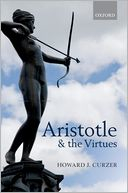Book by Curzer ’74, MA ’76 Focuses on Aristotle and Virtue Ethics

Aristotle has long been considered the father of virtue ethics. In his new book Aristotle and the Virtues (Oxford University Press), Howard Curzer ’74, MA ’76 considers Aristotle’s detailed description of the individual virtues to be central to his ethical theory. His study examines the Nicomachean Ethics virtue-by-virtue, explaining and generally defending Aristotle’s claims.

The book is divided into three sections: Moral Virtues, Justice and Friendship, and Moral Development. Justice and friendship are prominent in Aristotle’s virtue theory. Curzer argues that in Aristotle’s view justice and friendship are symbiotic. Other contemporary discussions have argued the opposite; justice seems to be a public, impartial, and dispassionate thing, while friendship is paradigmatically private, partial, and passionate.
Curzer also reveals how virtue ethics is not only about being good; it is also about becoming good. He reconstructs Aristotle’s account of moral development and considers how certain character types serve as stages of moral development. Certain catalysts and mechanisms lead from one stage to the next. Explaining why some people cannot make moral progress specifies the preconditions of moral development. Finally, Curzer describes Aristotle’s quest to determine the ultimate goal of moral development: happiness.
Curzer has taught at Texas Tech University since 1983. He has authored papers on virtue ethics, research ethics, biomedical ethics, moral development, the ethics of care, the Bible, the Confucian tradition, and topology. He received his BA and MA degrees in mathematics from Wesleyan and his PhD in philosophy from the University of Texas at Austin.

